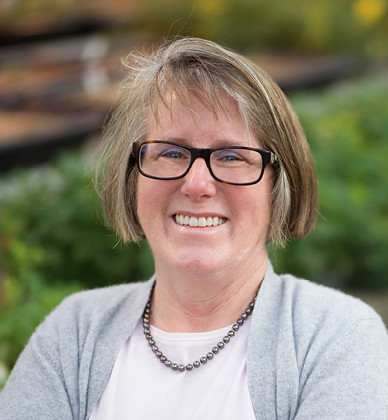Robin Buell, Ph.D.
Crop Genomics
The University of Georgia
Recruited: 2021
Robin Buell has worked in plant genomics since the earliest days of the field. Genomics aims to understand the genetic code that underlies a plant’s traits and interactions with its environment so that the code can be modified to yield benefits in food production, bioenergy and pharmaceuticals.
In 2000, Buell was part of the team that published the first sequencing of the genome of a plant (Arabidopsis). With that milestone, the entire genetic makeup of a plant was now visible, opening the door to identifying the functions of individual genes and gaining deeper understanding of plant behavior. The breakthrough was made possible by a global collaboration involving research groups in the U.S., Europe and Japan and funded by government agencies on three continents.
Buell also had a leading role in another historic project in the field: the sequencing of the rice genome in 2005, the first crop plant to be sequenced. This pioneering accomplishment revolutionized rice breeding and paved the way for genomic sequencing of other important crop species. The challenge was not only generating the genome, but also annotating it, an effort led by Buell’s lab. She still hosts the website that makes the annotated genome publicly available, and it continues to get 2 million hits a year.
Today, Buell continues to probe for the clues in plant genes that point to new ways to improve the plants themselves. She leverages her vast knowledge and applies bioinformatics while also making the most of the new technology and leveraging powerful computation.
The technology has developed astoundingly in the last 20 years. What once required a major collaboration and a significant investment in infrastructure and funding can be done in a week in her own lab, and for a few hundred dollars. Sequencing is now fast and easy, and genomic data is available for hundreds of plants. The real challenges lie in interpreting this data so it can be deployed for plant improvements.
More recently, Buell led a team that published the first potato genome sequence, another landmark event. The team also identified genes that are important to improving the domesticated potatoes grown today.
Apart from working on many key crop plants like rice, potatoes and maize, Buell seeks to understand medicinal plants better. She and colleagues are exploring what leads periwinkle to produce a chemical that is used in developing anti-cancer drugs. The plant produces the chemical in very small quantities; by understanding the biosynthetic pathway, researchers might be able to make the plant produce more of it, or use a more efficient system, such as yeast, to produce it.
Mint is another group of plants Buell has explored. Mints (Lamiaceae) produce diverse chemicals, which give them different uses – in cooking, for fragrance, as herbal remedies. To better understand this ubiquitous family, Buell worked with a multidisciplinary team that blended genomics with biochemistry and evolutionary biology.
One area of their study involves catnip, a member of the mint family that produces a compound cats love. Because the compound has the potential to be used as an insecticide, Buell’s team has explored the genes that lead to its production. Their aim is to use this knowledge to inform how the genes – and thus, the insecticidal properties associated with them – could be transferred to close relatives of catnip that don’t produce the compound.
If successful, Buell would be part of yet another significant breakthrough – this time, to help engineer plants that can naturally protect other species from insects.
Research
- Understanding plant genome architecture
- Understanding key events in plant evolution
- Developing new applications for genomics in agriculture
- Facilitating breeders to generate new varieties
- Accelerating discoveries in plant natural product biosynthesis
Straight from the Scholar
“Agriculture is the number one industry in the state, and there are a lot of new opportunities to explore. UGA’s strength is that it’s broad in agriculture and, specifically, in plant science research. The departments include crop and soil sciences, horticulture, plant biology, plant pathology and genetics, so you’ve got a broad perspective of plant science research. The university has momentum: it is doing a lot of new things and making continual investments.”

